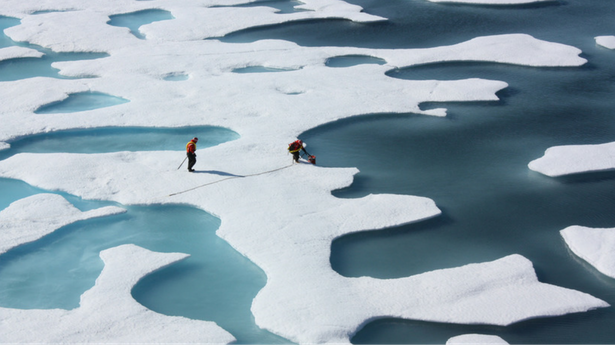The Arctic Ocean and its seas are among the world’s most vulnerable ecosystems, facing multiple threats from climate change, increased commercial shipping and fishing, and expanded offshore drilling. These activities decimate the precious Arctic environment, and impact the whales, polar bears, seals, bird species, and fish who live there. They also threaten the existence of the Arctic’s indigenous communities and their long tradition of living in harmony with this environment.
The Arctic’s average temperatures are rising more than twice as fast as in the rest of the world, as the heat-reflecting white ice is being replaced by dark, heat-absorbing water. As the indigenous leaders pointed out recently at a separate meeting in London organized by Global Greengrants Fund, summer in the Arctic today is two months longer than it used to be, with catastrophic impacts on the ability of indigenous communities to hunt for subsistence.
And, as the sea ice recedes, we are experiencing a new “gold rush” for some of the world’s last undiscovered oil and gas reserves. Seeing an opportunity for profit, big oil companies have been trying for years to drill in the Arctic. This would bring with it new transportation links – ports, rail lines, and roads – to move the coal, oil, and gas to manufacturing centers in China, India, and elsewhere. Commercial shipping companies are planning new shipping lanes which would dramatically increase emissions and the risk of oil spills, disturbing marine mammals, and resulting in grave impacts on the already threatened food security of indigenous communities in the region.
In response, indigenous communities across the Arctic region are mobilizing to defend their way of life and protect their environment.
“We can’t change climate change; we have to adapt. It is a hard battle but one that is here to stay”, says Hans Lennie, a member of the Inuvik Hunters and Trappers Committee and the Inuvialuit Game Council, who lives in the Canadian Beaufort region in Inuvik.
One way for Hans, Nikolay, and the other indigenous representatives to adapt is to engage with international processes, mainly by contributing their deep knowledge of the Arctic environment to climate change research and by attending international forums like the International Maritime Organization. Together with the Clean Arctic Alliance, the men are calling on the international community to adopt a legally binding instrument to end the use of heavy fuel oil in Arctic waters by 2020.
“In a tradition where the sense of environment comes from a spiritual place, progress has meant that some parts of their way of live have been irrevocably changed”, says Austin Ahmasuk, Marine Advocate for the Alaska Native organization, Kawerak. The change is mainly the result of external factors like climate change, but is also happening due to technological progress. For example, snowmobiles replacing dog sleds. How to protect cultural identity and take part in modern life at the same time is a common concern.
But there is hope, too.
Just one day after our meeting in London, the Ross Sea in the Antarctic was declared the world’s largest marine protected area in the world, after more than a decade of campaigning by scientists, conservationists, funders, and millions of global citizens. And it is through international treaties and constitutionally recognized rights that the indigenous Arctic activists see their biggest chance to protect their environment for future generations – by calling on the international community to make the right decisions to protect the Arctic before it is too late.
To support their efforts, Global Greengrants Fund channels small grants to groups like The Arctic Youth Ambassadors Program from Alaska, a coastal Arctic community which recently voted to relocate their village to escape rising sea levels and the impacts of climate change. Through small grants and events like the one held in London, we support indigenous groups in the Arctic in their efforts to implement locally relevant solutions, engage with governments and corporate actors, and share their knowledge with the world.
By Eva Rehse, Director of Global Greengrants Fund / UK & Europe
Photo Credit: NASA Goddard Space Flight/ CC BY-NC-SA 2.0, Lwp Kommunikáció/ CC BY-NC-SA 2.0, International Maritime Organization

